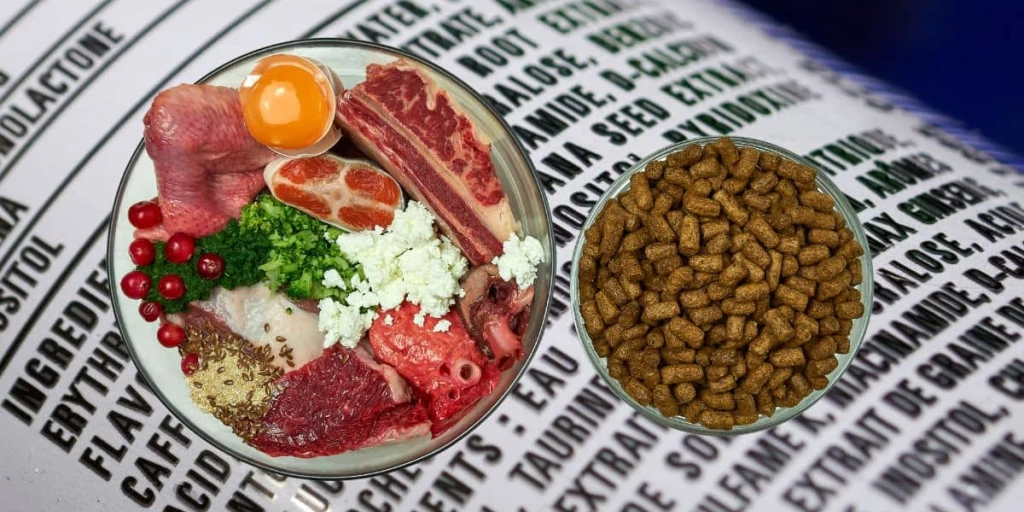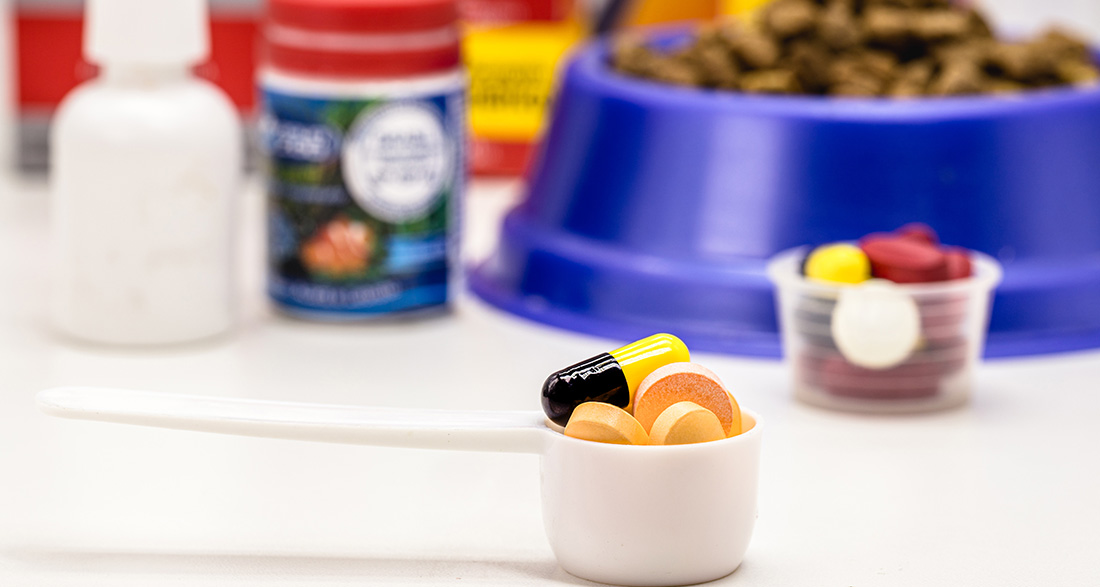Have you ever wondered if your dog is optimally supplied with everything he needs? Whether the demand for vitamins, trace elements, and nutrients is met? Many dog owners ask themselves these questions, and often it’s challenging to find an answer.
One way to support your dog’s health is by supplementing with dietary supplements. But how do you decide which supplement is right for your dog? In this article, we want to provide you with some ideas to answer this question. To do this, we sat down with our veterinarian, Monica, who shares her tips and tricks to make the decision easier.
- Dietary Supplements as a Meaningful Addition to Daily Feeding
- From Powder to Paste: An Overview of Various Forms of Dog Dietary Supplements
- Supplementing for Dogs: When and Why Is It Beneficial?
- Dog Food Composition: What to Consider and Question
- Feeding Puppies Correctly: Why Over-supplementation Can Be Dangerous
- Supplementation in Healthy Dogs: What to Consider
- Helpful Addition: 5 Tips for Supplementing with Your Dog’s Illness
- Should I Supplement My Senior Dog with Nutritional Supplements?
- Frequently Asked Questions
Here are the key points:
1. Dietary supplements support the feeding or therapy of the dog.
2. High-quality complete food meets the nutrient needs of a healthy dog.
3. Supplements help in specific situations such as activities, aging, or coat shedding.
4. They come in various forms like powder, pastes, liquids, or snacks.
5. The choice of form depends on your dog’s preference and the concentration of active ingredients.
6. Snacks and pastes often have lower active ingredient content than powders or liquids.
7. Products with added sugars and flavor enhancers should be avoided.
8. Check the ingredient list on each product.
Dietary Supplements as a Meaningful Addition to Daily Feeding
When searching for the right food for your dog, you are confronted with a variety of pet foods. Whether you look in the local pet store or explore the vastness of the internet, there is an inexhaustible selection of various pet foods:
- Complete Foods (wet and dry nature)
- Dietary Supplements
- Vitamin Supplements
- Nutrient Optimizers
- And much more.
Understandably, you may wonder what your dog needs and what it doesn’t.
In general, modern high-quality complete foods contain everything your healthy dog needs to meet its nutrient and vitamin requirements during normal activity. This means that the daily feeding covers your dog’s basic needs.
However, there are always situations in which your dog has an increased need, such as during coat shedding or when it cannot absorb the supplied nutrients optimally, e.g., in old age. By the way, the average lifespan of our dogs has now increased to 10–15 years.
Dietary supplements are, as the name suggests, a supplement to daily feeding or a complement to therapies. These include preparations with vitamins and nutrients as well as preparations that influence specific organs through their active ingredients.
From Powder to Paste: An Overview of Various Forms of Dog Dietary Supplements

Powder, paste, pressed form (snacks, pellets, tablets), capsule, liquid, herbal blend – here, too, you face the agony of choice.
Which is best suited for me and my furry friend?
- Powder:
Here, substances that already exist in solid form, such as collagen, are mixed in pure form, and usually, no additional additives are included. This provides a high concentration of active ingredients. - Herbal Blends:
Unless you know a “herb witch” who makes a mixture for you and your four-legged friend from fresh herbs, or you collect them yourself, herbs in herbal blends are in dried form. - Liquids:
Juice, syrup, tincture, extract – here too, you’ll find a variety of different names, depending on how the active ingredients are dissolved from the plants, what additional additives, such as vitamins, are included, and how the extracts are made durable. - Capsules:
The content of capsules is usually a powder surrounded by a shell, making it either easier to swallow or effective only in certain areas of the gastrointestinal tract. For example, an enteric coating, so that it dissolves only in the intestine and releases the content. - Pastes:
The basis here is usually a liquid extract from herbs, with or without additional additives of vitamins and minerals. Then, excipients are added to give it a pasty form. - Pressed Form:
Similar to pastes, a liquid extract usually serves as the basis here. To make pellets (similar to snacks, tabs, tablets), a solid binder is needed.
Which form of administration is best for you depends on what your dog prefers to eat. The best supplement is of no use if it stays in the bowl or ends up on the carpet instead of in your furry friend. Here, testing and letting your dog try different forms is the only real solution.
Based on my experience, snacks/tablets or pastes are the most popular among almost all dogs. Keep in mind that due to the addition of excipients/fillers, the active ingredient content is often lower than in pure powders or liquids. Avoid products with added sugars and flavor enhancers whenever possible.
Before making a choice for your dog, take a close look at the ingredient list. This must be clearly visible on every product. The encryption of the ingredients is easy to understand. The ingredient list shows which ingredients are present and in what quantity. The ingredient listed first in the list is the most abundant, while the one with the least amount is at the end.
If you ask me: I personally am not a fan of too many different ingredients or additives in dietary supplements. While there may be synergistic (complementary) effects, these are often not proven in most cases. Therefore, I prefer compositions with a few but well-thought-out ingredients, preferably from local sources.
Supplementing for Dogs: When and Why Is It Beneficial?

First, I recommend checking your complete food, look for important ingredients. These include proteins, carbohydrates, fats, vitamins, and minerals. Ideal are high-quality animal proteins, such as meat, fish, or organs, as dogs are carnivores, and their diet should consist mostly of animal components.
Dog Food Composition: What to Consider and Question
- Is my four-legged friend undergoing seasonal coat shedding?
- Have there been changes in its environment, such as a move, new companions (both two- and four-legged), owners suddenly working from home or back in the office, and has this increased stress levels?
- Does your dog accompany you in sports activities, such as jogging?
- Due to illness, are you perhaps less able to go for walks?
- And surely, there are more things that come to mind spontaneously.
All of this can lead to supplementation improving your furry friend’s quality of life and providing essential nutrients.
Feeding Puppies Correctly: Why Over-supplementation Can Be Dangerous
When it comes to puppies, I would be very cautious with supplementation. Especially during growth, the body is in a challenging metabolic state, as it not only needs to maintain tissues and functions but also regulate their growth.
Too much calcium, for example, can lead to problems in bone development, which is often difficult to regulate. Unfortunately, over-supplementation is often done during the growth phase in large breeds, which can lead to long-term musculoskeletal problems, such as arthritis.
If you feel that something is wrong with your puppy, please contact your veterinarian before taking any action yourself, as you might end up doing more harm than good to your beloved pet.
Supplementation in Healthy Dogs: What to Consider
In a healthy dog, you can take a proactive approach to prevent minor issues from developing into real problems. Your four-legged companion would likely benefit from receiving something that supports its immune system during periods of increased stress. Supplements containing Echinacea or Cat’s Claw are ideal for supporting your dog’s immune system.
As spring beckons and you become more active with your dog, you can help support its musculoskeletal system and promote skin metabolism.
Supplementing with products containing collagen, glucosamine, and chondroitin, as well as nettle and MSM (Methylsulfonylmethane), can help reduce stress on the musculoskeletal system and improve skin health. During coat shedding, your dog needs more energy and nutrients.
And the best part: These nutrients also benefit the human body!
Helpful Addition: 5 Tips for Supplementing with Your Dog’s Illness
Supplementary feed can also be used therapeutically to support various illnesses.
For musculoskeletal complaints, I have had very good experiences with:
- Collagen
- Hyaluron
- Chondroitin
- MSM (Methylsulfonylmethane)
- Glycosaminoglycans.
The latter is included in green-lipped mussel powder, which, according to studies, has a positive effect on arthritis not only in humans but also in dogs.
For metabolic disorders or liver problems, the administration of supplements containing milk thistle can be helpful. Even in gastrointestinal diseases, the use of probiotics can often achieve improvement. You can find a separate article on this in our guide.
If you notice changes in your dog’s health, it is advisable to consult a veterinarian as soon as possible to obtain an accurate diagnosis. This is the only way to ensure targeted and successful therapy to help your four-legged friend.
Should I Supplement My Senior Dog with Nutritional Supplements?
Getting up is not as easy, walks are slower and shorter. You will surely notice such or other signs in your dog as it ages. With sensible supplementation, it is possible to make your senior’s twilight years more comfortable.
As mentioned earlier, supporting your pet’s musculoskeletal system is crucial. Even with a weakening heart, you can work very well, for example, with hawthorn preparations, as shown by studies in humans, indicating a positive effect on heart function.
For more information on what to consider with your senior and how to support them, check out our article “What do old dogs need? Tips for everyday life with a senior dog.”
Conclusion
You have probably noticed that the question of whether dietary supplements are beneficial or not cannot be answered categorically. The answer depends on the individual dog, environmental influences, and why you want to supplement.
If you want to be completely sure, I recommend consulting your veterinarian or an independent nutritional consultant. For example, a blood test can determine whether your dog has an “excess” or “deficiency” of certain minerals, trace elements, or vitamins. This information can then be used to find a diet specifically tailored to your furry friend.
Our veterinarian authors would like to emphasize that their blogs do not replace veterinary advice. Despite all the exciting information, you should always clarify important health decisions individually for your pet and consult with your veterinarian. Therefore, we do not assume any liability for any damages that may arise from the use of the information presented in this blog. This article does not claim to be complete. (2024)
Frequently Asked Questions
Can I harm my dog with dietary supplements?
It is possible if your dog is already optimally nourished and then receives too much of a mineral, for example.
What should I consider when buying supplements?
It should have high-quality ingredients. The ingredients must always be listed on the package. There should not be too many different components.
Can I feed my dog supplements meant for humans?
This cannot be answered generally. There are substances that your furry friend ideally cannot utilize or, in the worst case, can lead to poisoning. Therefore, it is best to contact your veterinarian beforehand.
Where can I get dietary supplements?
There are now a variety of sources. However, I recommend not simply ordering anything on the Internet but consulting with an independent animal nutrition consultant or veterinarian before supplementation.


